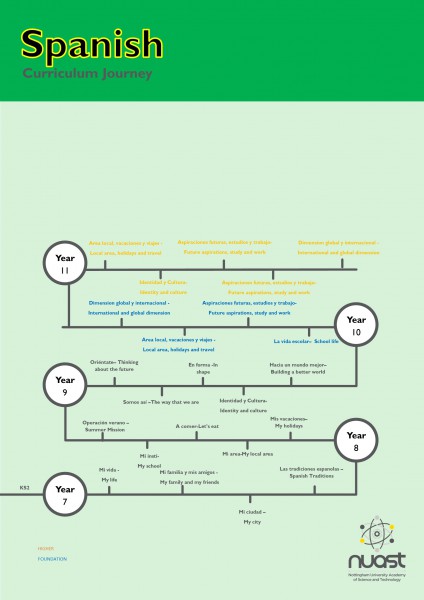Welcome to Modern Foreign Languages
Curriculum Intent: Spanish
Learning Spanish develops a person’s ability to connect with other people and is well proven to improve memory, decision making and the ability to multitask.
At NUAST Spanish develops students’ linguistic skills, increases their curiosity and deepens their understanding of their own cultural identity and that of others. Our curriculum cultivates linguists who are confident and self-motivated to use the four skill areas of speaking, writing, listening and reading. Students are encouraged to use Spanish spontaneously and resiliently. Learning is themed around real world topics, introducing increasingly complex levels of language as well as building students’ communication and literacy skills preparing them for a global society.
Students following the Spanish curriculum are articulate and capable linguists, who recognise the importance of languages for future career destinations and the world of work.
Introduction
Due to its popularity, Spanish has become a compulsory subject for KS3 in many schools in UK. Although it may seem that everyone speaks English, the truth is that over 75% of the world’s population do not and the demand of linguists is increasing every year. Being the second most spoken language in the world, after Mandarin, makes Spanish a good choice..
Key Stage 3
Spanish is currently offered in year 7, 8 and 9.
Year 7 topics:
- My life
- My family and friends
- My city
- Spanish traditions
Year 8 topics:
- My holidays
- Let's eat
- My school
- Summer Mission
Year 9 topics:
- Thinking about the future
- In shape
- Identity and culture
- Building a better world
GCSE
We offer GCSE courses in Spanish and are following the new Edexcel GCSE specification.
Theme 1: Identity and culture
- Topic 1: Me, my family and friends
- Topic 2: Technology in everyday life
- Topic 3: Free-time activities
- Topic 4: Customs and festivals in Spanish-speaking countries/communities
Theme 2: Local, national, international and global areas of interest
- Topic 1: Home, town, neighbourhood and region
- Topic 2: Social issues
- Topic 3: Global issues
- Topic 4: Travel and tourism
Theme 3: Current and future study and employment
- Topic 1: My studies
- Topic 2: Life at school/college
- Topic 3: Education post-16
- Topic 4: Jobs, career choices and ambitions
How is the course assessed?
Grades available – 9-1
For Spanish you are marked on four key areas - reading, writing, listening and speaking – these will be important skills to have when you apply for college, university and even a job.
Reading Exam – 25% Listening Exam – 25% Speaking Exam – 25% Writing Exam 25%
- The reading and listening exams are short and some answers are multiple choice.
- The oral assessments include a role-play, the description of a picture and a short conversation. We do lots of practice in class and few mocks before the final exam.
- The written assessment is based on the themes that we have learnt in class and students have to write only 150 words for the longest task.
How can parents support students in this subject?
- Regular checking of homework tasks; testing weekly vocabulary on Quizlet.
- Highlight relevant media articles about Spanish, from newspapers, magazines or the internet. Encourage students to watch the international news and take an interest in the world around them.
Links
- Quizlet: https://quizlet.com (45 minutes per week recommended to learn key vocabulary)
- Edexcel GCSE Spanish: https://qualifications.pearson.com/en/qualifications/edexcel-gcses/spanish-2016.html
- Spanish revision website: http://www.spanishrevision.co.uk/gcse/gcse_index.htm
- Languages gym: https://language-gym.com/#!/ (30 minutes per week of “verb trainer” recommended to practise tenses)
- BBC Bitesize GCSE Spanish: https://www.bbc.com/bitesize/subjects/z4dqxnb
- Lyrics training Spanish: https://es.lyricstraining.com/

